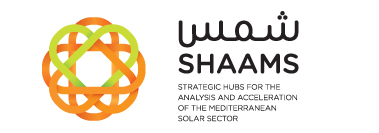Six projects, 19 regions of 10 countries in the Mediterranean region, 56 partners and more than 150 initiatives. These are just some of the numbers behind the projects promoting solar energies that have been carried out in the last 3 years.
Barcelona Chamber of Commerce leads the transnational cooperation project SHAAMS.
Barcelona, 3rd December 2015. The European Union has decided to achieve at least a 20 percent reduction in greenhouse gases emissions by 2020; they plan to do so by increasing the share of renewable energy in final energy consumption to 20 percent and moving towards a 20 percent increase in energy efficiency. The main aim is to drastically reduce CO2 emissions; in view of the 2050 horizon the EU is promoting public policies that encourage the production of clean energy.
In the Mediterranean region, specifically, six European founded projects promoting the production of solar energy, are currently underway, the results of said projects were presented at the 2nd Mediterranean Solar Forum that took place the week within the framework of the 9th Mediterranean Week of Economic Leaders organised by ASCAME (the Association of the Mediterranean Chambers of Commerce and Industry), Barcelona’s Chamber of Commerce and the Union for the Mediterranean.
The following projects were presented during the Forum and are part of the ENPI CBC Mediterranean Sea Basin Programme (within the framework of the European Neighbourhood and Partnership policies): MED SOLAR led by Trama TecnoAmbiental; FOSTERinMED led by the University of Cagliari: SHAAMS led by the Barcelona Chamber of Commerce; DIDSOLIT-PB led by the Autonomous University of Barcelona; and, MED DESIRE led by the ARCA consortium and the Andalusian Bureau of Energy.
The projects by the numbers:
The six projects are being developed in 19 regions of 10 countries in the Mediterranean region, with 56 partners. There has been an inversion of 25 million Euros altogether; more than 150 workshops and meetings have been organised; more than 70 conferences have been held, and there has been extensive cooperation with public institutions, researchers, universities, businesses and entrepreneurs.
Thanks to the technology installed, more than thirty buildings will be able to save 5 million Euros that otherwise would have had to spend on electrical bills, the emission of thousands of tonnes of 2CO2 will be avoided and more than 100.000 people will be able to take advantage of the actions planned for the forthcoming years.
SHAAMS Project
Amongst other projects, SHAAMS (Strategic Hubs for the Analysis and Acceleration of the Mediterranean Solar Sector) stands out, led by the Barcelona’s Chamber of Commerce, SHAAMS is a transnational cooperation plan, born with the goal of defining and implementing strategic policies that fostered the production of solar energy within the Mediterranean regions.
At the Forum 280 people met and spokespersons presented the main activities that SHAAMS has organised in the last two years: 16 workshops; 18 business exchanges; the creation of 10 jobs; six awareness sessions in 14 schools and about a hundred of other activities that have involved 750 specialists reaching more than 5.000 people.
Energy Roadmap 2050
At the workshops held in the 2nd Mediterranean Solar Forum there was a broad consensus amongst project leaders concerning the need to keep on working along the same lines as they have done in the last three years, working towards higher energy efficiency and new strategies towards self-supply.
However they recognise the need to resolve persisting issues that economic actors in many countries still face when they want to produce renewable energy, such as difficulties to supply or a low market penetration.
Certainly, the economic circumstances have hardly helped in this sense, since a large number of governments in the region have avoided fostering new models of efficient and innovative growth that use clean energy.
As they exposed, the main hurdles are public regulations and lacking infrastructures, which will make it very hard to accomplish the goal of zero CO2 emission by 2050.
Nonetheless, it became clear that the Mediterranean regions are rich in natural resources and have one of the higher UV Indexes in the world. Hydroelectric energy, solar radiation and wind, all show a high energy potential. Estimations show that, if the trend remains stable, by 2030 renewable energies will represent the 35 percent of production in the region. For this reason the European Union is committed to promote the production of renewable energy, especially solar energy
-
Recent Posts
- Jordan shine a light on the climate action
- The II Mediterranean Solar Forum Video
- SHAAMS Celebrates 3 years of success-Warm Wishes
- SHAAMS Final Event-Celebrating Achievements at the 2nd Mediterranean Solar Forum
- The European Union supports with more than 25 million Euros projects to promote solar energy in the Mediterranean region







